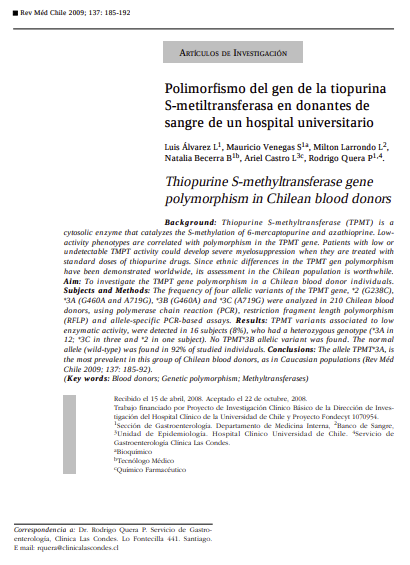Polimorfismo del gen de la tiopurina S-metiltransferasa en donantes de sangre de un hospital universitario
Licencia: Creative Commons (by)
Autor(es): Venegas, Mauricio
Background: Thiopurine S-methyltransferase (TPMT) is a cytosolic enzyme that catalyzes the S-methylation of 6-mercaptopurine and azathioprine. Lowactivity phenotypes are correlated with polymorphism in the TPMT gene. Patients with low or undetectable TMPT activity could develop severe myelosuppression when they are treated with standard doses of thiopurine drugs. Since ethnic differences in the TPMT gen polymorphism have been demonstrated worldwide, its assessment in the Chilean population is worthwhile. Aim: To investigate the TMPT gene polymorphism in a Chilean blood donor individuals. Subjects and Methods: The frequency of four allelic variants of the TPMT gene, *2 (G238C), *3A (G460A and A719G), *3B (G460A) and *3C (A719G) were analyzed in 210 Chilean blood donors, using polymerase chain reaction (PCR), restriction fragment length polymorphism (RFLP) and allele-specific PCR-based assays. Results: TPMT variants associated to low enzymatic activity, were detected in 16 subjects (8%), who had a heterozygous genotype (*3A in 12; *3C in three and *2 in one subject). No TPMT*3B allelic variant was found. The normal allele (wild-type) was found in 92% of studied individuals. Conclusions: The allele TPMT*3A, is the most prevalent in this group of Chilean blood donors, as in Caucasian populations.
[2009]
Compartir:
Una vez que el usuario haya visto al menos un documento, este fragmento será visible.


